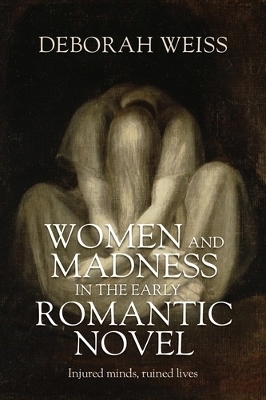
Women and Madness in the Early Romantic Novel
Injured Minds, Ruined Lives
Seiten
2024
Manchester University Press (Verlag)
978-1-5261-7571-7 (ISBN)
Manchester University Press (Verlag)
978-1-5261-7571-7 (ISBN)
- Lieferbar (Termin unbekannt)
- Versandkostenfrei
- Auch auf Rechnung
- Artikel merken
This book argues that early Romantic-Period women novelists used female madness to critique patriarchal structures of control and to revise misogynistic medical and popular sentimental models that blamed inherent female weakness and the aberrant female body for women’s mental and emotional afflictions. -- .
Women and madness in the early Romantic novel returns madness to a central role in feminist literary criticism through an updated exploration of hysteria, melancholia, and love-madness in novels by Mary Wollstonecraft, Eliza Fenwick, Mary Hays, Maria Edgeworth, and Amelia Opie. This book argues that these early Romantic-period novelists revised medical and popular sentimental models for female madness that made inherent female weakness and the aberrant female body responsible for women’s mental afflictions. The book explores how the more radical authors — Wollstonecraft, Fenwick and Hays — blamed men and patriarchal structures of control for their characters’ hysteria and melancholia, while the more mainstream writers — Edgeworth and Opie — located causality in less gendered and less victimized accounts. Taken as a whole, the book makes a powerful case for focusing on women’s mental health in eighteenth- and nineteenth- century literary criticism. -- .
Women and madness in the early Romantic novel returns madness to a central role in feminist literary criticism through an updated exploration of hysteria, melancholia, and love-madness in novels by Mary Wollstonecraft, Eliza Fenwick, Mary Hays, Maria Edgeworth, and Amelia Opie. This book argues that these early Romantic-period novelists revised medical and popular sentimental models for female madness that made inherent female weakness and the aberrant female body responsible for women’s mental afflictions. The book explores how the more radical authors — Wollstonecraft, Fenwick and Hays — blamed men and patriarchal structures of control for their characters’ hysteria and melancholia, while the more mainstream writers — Edgeworth and Opie — located causality in less gendered and less victimized accounts. Taken as a whole, the book makes a powerful case for focusing on women’s mental health in eighteenth- and nineteenth- century literary criticism. -- .
Deborah Weiss is Professor of English at the University of Alabama -- .
Introduction: Women and madness in the early-Romantic novel
1 Madness and Maria: The Wrongs of Woman and patriarchal control
2 Of Madness and monitors: Secresy; or, the Ruin on the Rock
3 Death by despair: Fatal melancholia in The Victim of Prejudice
4 Misplaced passions, erroneous associations and remorse: Madness reconsidered in Belinda
5 The impossibility of love-madness: The Father and Daughter
Coda: Wide Sargasso Sea: The erasure of love-madness and the mad woman’s revenge
Bibliography
Index -- .
| Erscheinungsdatum | 24.10.2024 |
|---|---|
| Zusatzinfo | 0 illustrations |
| Verlagsort | Manchester |
| Sprache | englisch |
| Maße | 156 x 234 mm |
| Themenwelt | Geisteswissenschaften ► Sprach- / Literaturwissenschaft ► Anglistik / Amerikanistik |
| Geisteswissenschaften ► Sprach- / Literaturwissenschaft ► Literaturgeschichte | |
| Geisteswissenschaften ► Sprach- / Literaturwissenschaft ► Literaturwissenschaft | |
| ISBN-10 | 1-5261-7571-1 / 1526175711 |
| ISBN-13 | 978-1-5261-7571-7 / 9781526175717 |
| Zustand | Neuware |
| Haben Sie eine Frage zum Produkt? |
Mehr entdecken
aus dem Bereich
aus dem Bereich
Poetik eines sozialen Urteils
Buch | Hardcover (2023)
De Gruyter (Verlag)
CHF 83,90
Buch | Softcover (2024)
belleville (Verlag)
CHF 27,95


